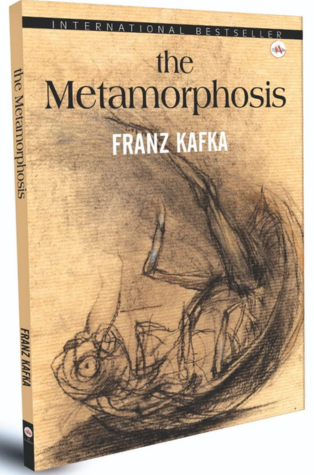Description
Franz Kafka has created a masterpiece with his breathtaking novella “the Metamorphosis.” Written in 1912 and published in 1915, the author gives a glimpse of his style of writing i.e. absurdism. In today’s world, Kafka’s writing style is now called Kafkaesque.
The plot revolves around the protagonist, Gregor Samsa, a salesman who wakes up one morning and notices that he has metamorphosed into a monstrous vermin. When his attempt to move flexibly fails and his body feels restricted, he inspects himself. This is when he realizes that his body is completely transformed into an insect. He prays that this is his bad dream, but soon the reality dawns upon him.
As Gregor Samsa awoke one morning from uneasy dreams he found himself transformed in his bed into a gigantic insect.
When Gregor does not come out of the room for a disturbingly long time, his family decides to check on him. The matters worsen when his colleague from the office arrives to confront him regarding his absence at work. He is left with no option but to show himself to his family.
Gregor comes from a family of 04, his mother, father, and a younger sister, Greta. His role as the primary breadwinner for his family means that his job is crucial for their well-being. In his insect form, he struggles to make his days better and hopelessly wishes to communicate with his family. Perplexed by his sudden transformation, he struggles to find a solution. Everyday he fights hard to accept the situation and make the most of it by believing in his destiny.
“I cannot make you understand. I cannot make anyone understand what is happening inside me. I cannot even explain it to myself.”
For the next few months, his sister Greta becomes his caretaker. Initially, she takes care of the insect (Gregor) with love, care, and enthusiasm bringing him food and spending time with him. But as the time passes, she and his entire family become indifferent to him. Feeling depressed and hopeless, Gregor isolates himself from his family, avoiding food and spending days motionless like a lifeless object.
No longer concerning herself about what Gregor might particularly care for, the sister hastily shoved any old food through the door to Gregor’s room with her foot, both morning and noon before she raced to work, and in the evening cleared it all out with one sweep of the broom, indifferent to whether the food had only been tasted or—as was most frequently the case—left completely untouched.
Soon enough he realizes that he is nothing but a burden on his family. His changed identity also meant that he is no longer considered as his parents’ son or Greta’s brother. He is just an insect living in the house. Acknowledging the fact that he was once their Gregor, his family does not get rid of him from home but slowly starts ignoring him. The feeling of loneliness, detachment, and, abandonment crushes his heart.
Gregor tries hard to win his family’s love back. He doesn’t lose hope, not even in his final moments until he sees that now his family has given up on him completely.
That is when he ultimately accepts death as a necessary sacrifice for the sake of his family as well as to end his pain.
He remained in this state of empty and peaceful rumination until he heard the clock tower strike three in the morning. He watched as it slowly began to get light everywhere outside the window too. Then, without his willing it, his head sank down completely, and his last breath flowed weakly from his nostrils.
The story is straightforward, yet has multiple layers to it. Human emotions and behaviours are intricately explained through each character. Kafka sheds light on the fact that the world tends to discard the ones who are no longer useful. Relationships are mercurial. As long as there is a certain give and take, they are relevant. In this novella, Kafka visibly portrays the devastating consequences of isolation on one’s mind and body. The awareness of mental health is widespread today, but Kafka brilliantly articulated it over a century ago in his masterpiece, ‘the Metamorphosis’.








Reviews
There are no reviews yet.